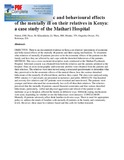| dc.contributor.author | Ndetei David M. | |
| dc.contributor.author | Pizzo, M | |
| dc.contributor.author | Khasakhala, LI | |
| dc.contributor.author | Maru, HM | |
| dc.contributor.author | Mutiso, VN | |
| dc.contributor.author | Ongecha-Owuor, FA | |
| dc.contributor.author | Kokonya, DA | |
| dc.date.accessioned | 2013-04-27T10:06:10Z | |
| dc.date.available | 2013-04-27T10:06:10Z | |
| dc.date.issued | 2009-11 | |
| dc.identifier.citation | Afr J Psychiatry (Johannesbg). 2009 Nov;12(4):293-9 | en |
| dc.identifier.uri | http://www.ncbi.nlm.nih.gov/pubmed/20033112 | |
| dc.identifier.uri | http://erepository.uonbi.ac.ke:8080/xmlui/handle/123456789/17348 | |
| dc.description.abstract | OBJECTIVE:
There is no documented evidence in Kenya on relatives' perceptions of economic and behavioural effects of the mentally ill patients and their coping mechanisms. To document what relatives of mentally ill patients perceive to be the economic effects of the patients on the family and how they are affected by and cope with the disturbed behaviours of the patients.
METHOD:
This was a cross-sectional descriptive study conducted at the Mathari Psychiatric Hospital. Informed consent was obtained from both the relatives and the patients admitted at the hospital. Data on socio-demographic and economic profiles were obtained from the patients and their relatives. The relatives were interviewed using a structured questionnaire to determine what they perceived to be the economic effects of the mental illness, how the various disturbed behaviours of the mentally ill affected them, and how they coped. The data were analysed using SPSS version 11.5 and results are presented in narratives and tables.
RESULTS:
One hundred and seventy-five relatives and 107 patients were recruited and interviewed. The patients were younger and better educated but economically less well off than their relatives. The relatives perceived that the mentally ill patients caused financial constraints and that various disturbed behaviours, particularly, verbal and physical aggression and refusal of the patient to take medicine or go to hospital, affected the family in different ways. Different coping mechanisms were used, depending on whether or not the behaviours were intrusive.
CONCLUSION:
Mentally ill patients adversely affect their families in diverse ways. There is need for appropriate policy to address the needs of families with mentally ill patients at the family and community levels. However, these must be evidence-based and this calls for further research. | en |
| dc.language.iso | en | en |
| dc.title | Perceived economic and behavioural effects of the mentally ill on their relatives in Kenya: a case study of the Mathari Hospital | en |
| dc.type | Article | en |
| local.publisher | Africa Mental Health Foundation, Nairobi, Kenya | en |
| local.publisher | Department of Psychiatry, University of Nairobi, Nairobi, Kenya; | en |

